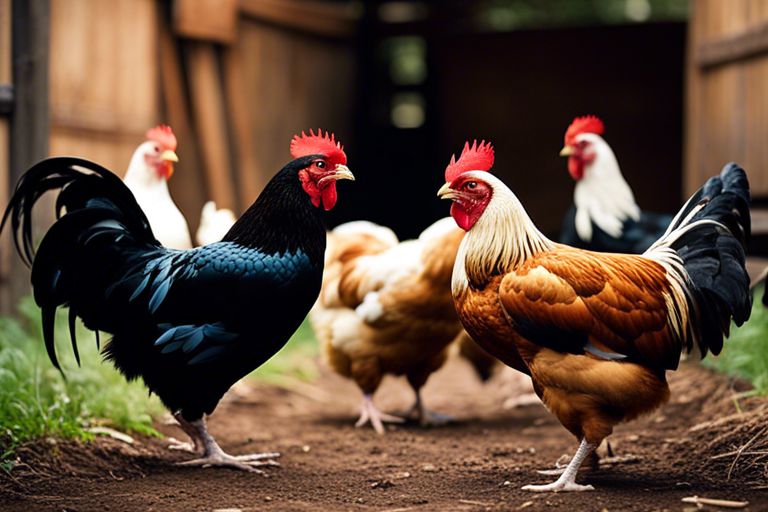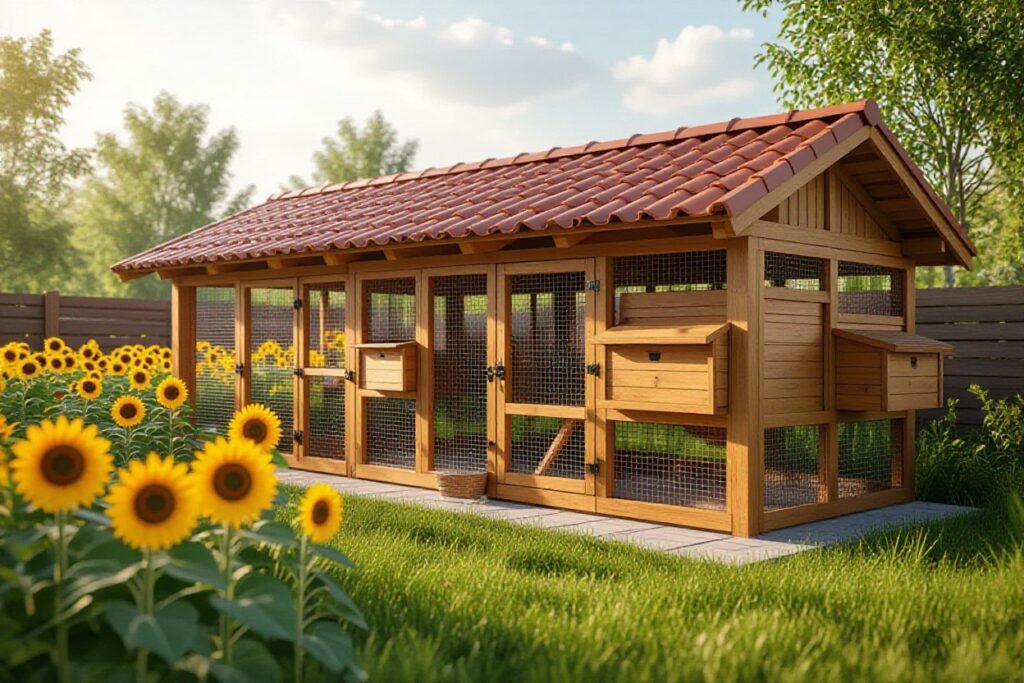With roosters playing a crucial role in the dynamics of a chicken flock, it’s crucial to prioritize socialization to ensure healthy and harmonious relationships among your feathered friends. Understanding how to effectively socialize your roosters can lead to a cohesive flock environment where hierarchy is established and maintained. By implementing proven techniques and strategies, you can cultivate strong bonds among your roosters, fostering a peaceful and thriving flock. In this blog post, we will examine into the importance of rooster socialization and provide practical tips on how to build strong relationships within your flock.
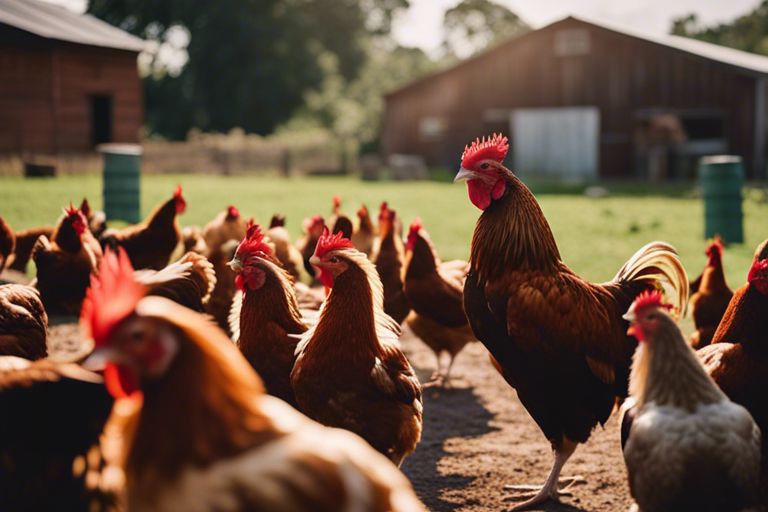
Understanding Rooster Behavior
The Role of a Rooster in the Flock
Roosters play a vital role in the social dynamics of a flock. They act as protectors, alerting hens of danger, and maintaining order within the group. Roosters also guide hens to food sources and help them find suitable places to nest. Their presence often brings a sense of security to the flock and can help reduce stress levels among the hens.
Signs of Rooster Aggression and Social Order
Order within a chicken flock is crucial for maintaining peace and harmony. Roosters establish a social hierarchy through displays of dominance and aggression. Signs of rooster aggression include chest bumping, pecking, and loud crowing. It is necessary for flock owners to observe these behaviors to prevent serious injuries among flock members and ensure a healthy social order is maintained.
Understanding the social dynamics and behaviors of roosters is key to building a strong and cohesive flock. By recognizing the role of the rooster and being aware of signs of aggression, flock owners can create a harmonious environment for their feathered friends.
Socialization Techniques
Integrating Roosters into an Existing Flock
You may want to introduce a new rooster into your existing flock for a variety of reasons, such as breeding or expanding your flock. To successfully integrate a new rooster, it is crucial to do so gradually and carefully. Begin by providing a separate but adjacent living space for the new rooster to get acclimated to the sights and sounds of the existing flock. After a week or so, you can start allowing supervised interaction between the roosters to reduce aggression and establish a pecking order.
Managing Multiple Roosters
Adding multiple roosters to your flock can result in territorial disputes and aggression, so it’s necessary to have a plan in place to manage them effectively. An important consideration is to ensure there are enough hens for each rooster to prevent excessive competition. Additionally, providing ample space, hiding spots, and enrichment activities can help reduce tension among the roosters and promote a harmonious flock dynamic.
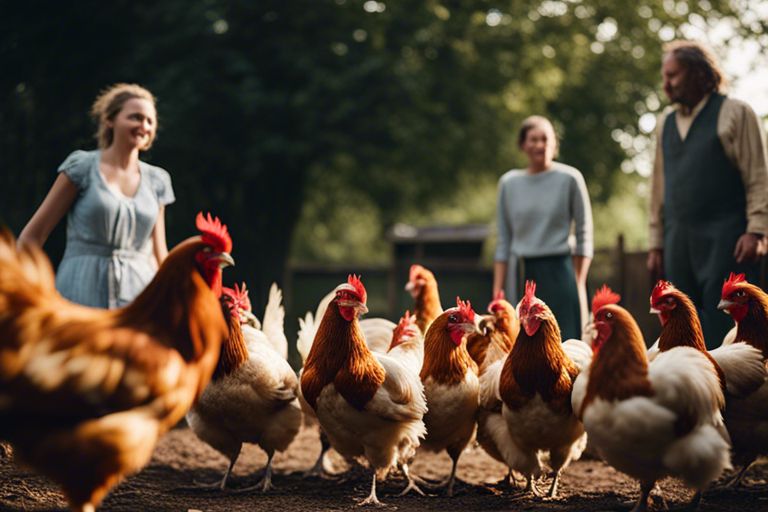
Enhancing Rooster Relationships
Establishing a Pecking Order
The establishment of a pecking order within your flock is a natural occurrence in the world of chickens. This hierarchy helps maintain order and reduces conflict by clearly defining each rooster’s place in the group. To allow this process to unfold smoothly, avoid interfering in minor skirmishes unless they become excessively aggressive. Through these interactions, roosters will establish their rank and learn to coexist harmoniously.
Encouraging Positive Interactions
Pecking order interactions may sometimes lead to aggressive behavior, but it’s imperative to encourage positive interactions among your roosters. Providing a spacious and enriching environment can help reduce stress and boredom, leading to healthier social dynamics. Additionally, ensuring an adequate supply of food and water can prevent competition and foster cooperation within the flock.
Order within a flock is crucial for maintaining harmony and reducing stress among roosters. By establishing and reinforcing a clear pecking order and encouraging positive interactions, you can foster strong relationships within your flock. Remember to observe their behavior regularly and intervene only when necessary to maintain a peaceful and thriving flock.
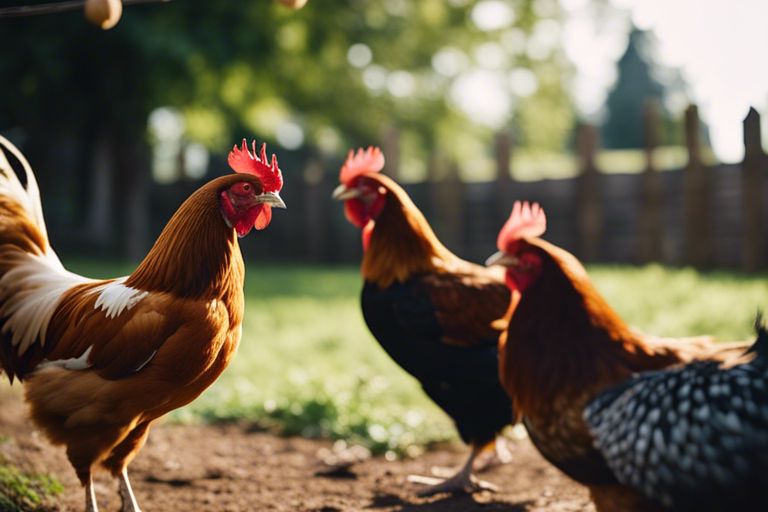
Day-to-Day Management for a Harmonious Flock
Adequate Space and Resources
Not providing enough space and resources for your flock can lead to stress, aggression, and overall discontent among your roosters. Make sure your coop and run are spacious enough to accommodate all birds comfortably, with plenty of room to move around, perch, and dust bathe. Adequate food and water stations should be available to prevent bullying or competition for resources.
Monitoring and Maintaining the Peace
With a careful eye, observe the interactions and dynamics within your flock. Regularly check for signs of bullying, pecking order disputes, or injuries. Address any issues promptly to prevent escalation of conflicts. Rotating various enrichment activities and treats can help distract and redirect negative behaviors, promoting a more harmonious environment.
This proactive approach to monitoring and managing your rooster flock helps ensure a peaceful and balanced coexistence among the birds. By meeting their basic needs and actively addressing any conflicts that may arise, you can foster strong relationships and a well-functioning flock.
Summing up
To wrap up, rooster socialization is crucial for building strong relationships within your flock. By introducing new birds properly, providing adequate space and resources, understanding rooster behavior, and intervening when needed, you can create a harmonious and balanced flock dynamic. Strong relationships among your roosters can lead to a more peaceful and productive environment, ultimately benefiting the overall health and well-being of your entire flock.
FAQ – Rooster Socialization – Building Strong Relationships In Your Flock
Q: Why is socialization important for roosters?
A: Socialization is important for roosters as it helps in building strong relationships within the flock, reducing aggression, and promoting harmony among the birds.
Q: How can I socialize my roosters with other chickens?
A: To socialize your roosters with other chickens, introduce them to the flock gradually, monitor their interactions, and provide enough space and resources to prevent competition.
Q: What are some signs of aggression in roosters that I should watch out for?
A: Signs of aggression in roosters include pecking, chasing, wing-flapping, and loud crowing. It’s important to address aggression promptly to avoid injuries within the flock.
Q: Can I socialize adult roosters or is it better to start when they are chicks?
A: While socializing roosters as chicks is ideal, adult roosters can also be socialized with patience and proper management techniques. It may take longer for adult roosters to adjust to a new social environment.
Q: How can I prevent bullying within my flock during the socialization process?
A: To prevent bullying within your flock, provide multiple feeding and watering stations, sufficient space for each bird to establish their territory, and separate any overly aggressive roosters if necessary.
Q: What role does the rooster play in the social structure of a flock?
A: Roosters play a vital role in the social structure of a flock by protecting the hens, establishing a pecking order, and communicating with the flock through various vocalizations and behaviors.
Q: Are there any benefits to socializing roosters beyond reducing aggression?
A: Yes, socializing roosters can also improve overall flock dynamics, increase egg production by reducing stress in hens, and create a more harmonious living environment for all birds in the flock.
